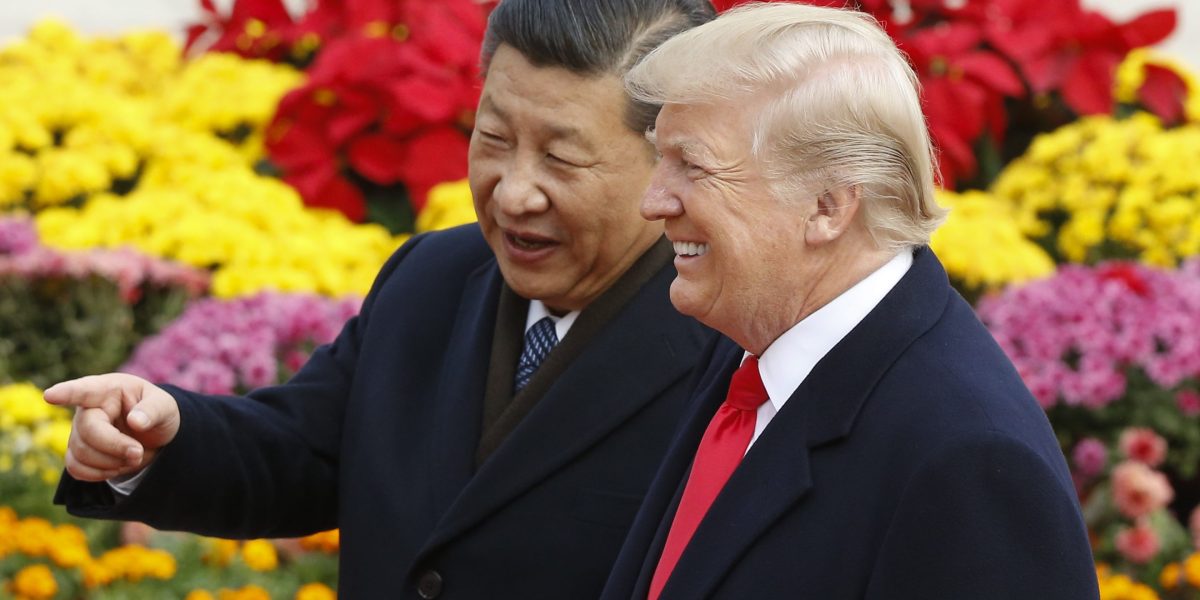Some people with depression have tiny changes in their DNA that affect how specific genes are turned on or off. A new study, published in the journal Nature Genetics, looked at these changes in brain cells from 84 people: some with depression…
Blog
-

Markets expect Trump’s latest China tariffs will backfire as gold jumps and the dollar ‘is not looking healthy’
Financial markets suffered a rerun of their swoon in April, when “Liberation Day” tariffs shocked global investors, signaling that his latest China duties may end up hurting the U.S. more than their intended target.
On Friday, President Donald Trump said he will impose an additional 100% tariff on China and limit U.S. exports of software, after China restricted its exports of rare earths.
The S&P 500 sank 2.7%, its worst selloff since April 10. Meanwhile, the U.S. dollar index plunged nearly 0.7% as Treasury yields fell, while gold prices surged more than 1.5%.
“Markets are again thinking that the US holds the shorter straw in the tariff fight with China,” Robin Brooks, a senior fellow at the Brookings Institution, wrote on Substack on Saturday.
China has a stranglehold on rare earths, producing more than 90% of the world’s processed rare earths and rare earth magnets. That has served as a key source of leverage over the U.S.
The divergence between the dollar and gold is notable because stock market selloffs historically have sent investors to the dollar as a safe haven.
But just like in the fallout from Liberation Day, that dollar pattern didn’t hold, and gold instead was the preferred refuge from trade war chaos.
Brooks pointed out that the dollar had been stable in recent weeks even as gold prices soared, notching record high after record high. That ended with Friday’s China tariff announcement from Trump.
“This is now the second instance where markets are trading tariffs as backfiring on the US, not on the rest of the world,” he added.
Considering how stocks, currencies and gold reacted on Friday, Brooks said the overall picture is that the dollar actually looks more vulnerable now than it did in early April.
In particular, he pointed to how much the dollar fell when weighed alongside the steep drop in stocks, which ordinarily boosts the greenback amid a flight to safety.
“The fact that this didn’t happen and that gold prices rose more than on ‘Liberation Day’ is concerning,” Brooks warned. “The Dollar is not looking healthy.”
Before the tariff flare-up, U.S.-China trade talks had been progressing after Trump reached deals with the European Union, Japan, South Korea and other top trading partners.
But tensions remained, including on the issue of rare earths while the U.S. had moved to restrict other countries’ exports of semiconductor-related products to China.
Also this week, the U.S. announced port fees on Chinese ships, prompting Beijing to impose a similar fee on U.S. ships docking at Chinese ports. China also launched an antitrust investigation into U.S. chipmaker Qualcomm.
Then on Thursday, China’s commerce ministry said that starting on Dec. 1 a license will be required for foreign companies to export products with more than 0.1% of rare earths from China or that are made with Chinese production technology.
“In other words, the United States can cut China off from the chips of today, but China can make it vastly harder to build the chips and other advanced technologies of tomorrow,” Michael Froman, president of the Council on Foreign Relations and a former U.S. Trade Representative, said in a post on Friday.
Fortune Global Forum returns Oct. 26–27, 2025 in Riyadh. CEOs and global leaders will gather for a dynamic, invitation-only event shaping the future of business. Apply for an invitation.Continue Reading
-

Aryna Sabalenka’s perfect record ends; Jessica Pegula sets up Wuhan final against Coco Gauff | Tennis News
Jessica Pegula secured a remarkable victory against world number one Aryna Sabalenka, winning 2-6, 6-4, 7-6 (7/2) in the Wuhan semi-finals. She will now face…
Continue Reading
-
Apple set for blockbuster F1 rights deal – Austin reveal expected
In a move that could reshape the future of sports broadcasting, Apple is reportedly on the verge of taking over Formula 1’s U.S. media rights from 2026 – ending ESPN’s current run as the sport’s American home.
According to a report from…
Continue Reading
-
Grayson Long Finishes Fifth at Last ISU Junior Grand Prix – Skate Canada
- Grayson Long Finishes Fifth at Last ISU Junior Grand Prix Skate Canada
- Abu Dhabi to host Grand Prix Figure Skating Championship on 8th October BelTA – News
- Junior Grand Prix Figure Skating Championship 2025 kicks off in Abu Dhabi Big News…
Continue Reading
-

At $562K, This BMW 3.0CSL with Le Mans and Spa History Is a Winner
Belgium isn’t the first country you think of for … anything, really. The Belgians don’t even get credit for French fries, even though they most likely invented them. And Belgium certainly isn’t the first name in cars, even…
Continue Reading
-

At $562K, This BMW 3.0CSL with Le Mans and Spa History Is a Winner
Belgium isn’t the first country you think of for … anything, really. The Belgians don’t even get credit for French fries, even though they most likely invented them. And Belgium certainly isn’t the first name in cars, even…
Continue Reading
-
Notorious Lahore gangster Teefi Butt killed on the outskirts of Rahim Yar Khan: CCD – Dawn
- Notorious Lahore gangster Teefi Butt killed on the outskirts of Rahim Yar Khan: CCD Dawn
- Prime suspect in Ameer Balaj murder case, Teefi Butt, killed in police encounter in RYK The Express Tribune
- Teefi Butt extradited from Dubai to Lahore The…
Continue Reading
-

Blockchain Will Drive the Agent-to-Agent AI Marketplace Boom
AI agents, software systems that use AI to pursue goals and complete tasks on behalf of users, are proliferating. Think of them as digital assistants that can make decisions and take actions towards goals you set without needing step-by-step instructions — from GPT-powered calendar managers to trading bots, the number of use cases is expanding rapidly. As their role expands across the economy, we have to build the right infrastructure that will allow these agents to communicate, collaborate and trade with one another in an open marketplace.
Big tech players like Google and AWS are building early marketplaces and commerce protocols, but that raises the question: will they aim to extract massive rents through walled gardens once more? Agents’ capabilities are clearly rising, almost daily, with the arrival of new models and architectures. What’s at risk is whether these agents will be truly autonomous.
Autonomous agents are valuable because they unlock a novel user experience: a shift from software as passive or reactive tools to active and even proactive partners. Instead of waiting for instructions, they can anticipate needs, adapt to changing conditions, and coordinate with other systems in real time, without the user’s constant input or presence. This autonomy in decision-making makes them uniquely suited for a world where speed and complexity outpace human decision-making.
Naturally, some worry about what greater decision-making autonomy means for work and accountability — but I see it as an opportunity. When agents handle repetitive, time-intensive tasks and parallelize what previously had to be done in sequence, they expand our productive capacity as humans — freeing people to engage in work that demands creativity, judgment, composition and meaningful connection. This isn’t make-believe, humanity has been there before: the arrival of corporations allowed entrepreneurs to create entirely new products and levels of wealth previously unthought of. AI agents have the potential to bring that capability to everyone.
On the intelligence side, truly autonomous decision-making requires AI agent infrastructure that is open source and transparent. OpenAI’s recent OSS release is a good step. Chinese labs, such as DeepSeek (DeepSeek), Moonshot AI (Kimi K2) and Alibaba (Qwen 3), have moved even quicker.
However, autonomy is not purely tied to intelligence and decision making. Without resources, an AI agent has little means to enact change in the real world. Hence, for agents to be truly autonomous they need to have access to resources and self-custody their assets. Programmable, permissionless, and composable blockchains are the ideal substrate for agents to do so.
Continue Reading

